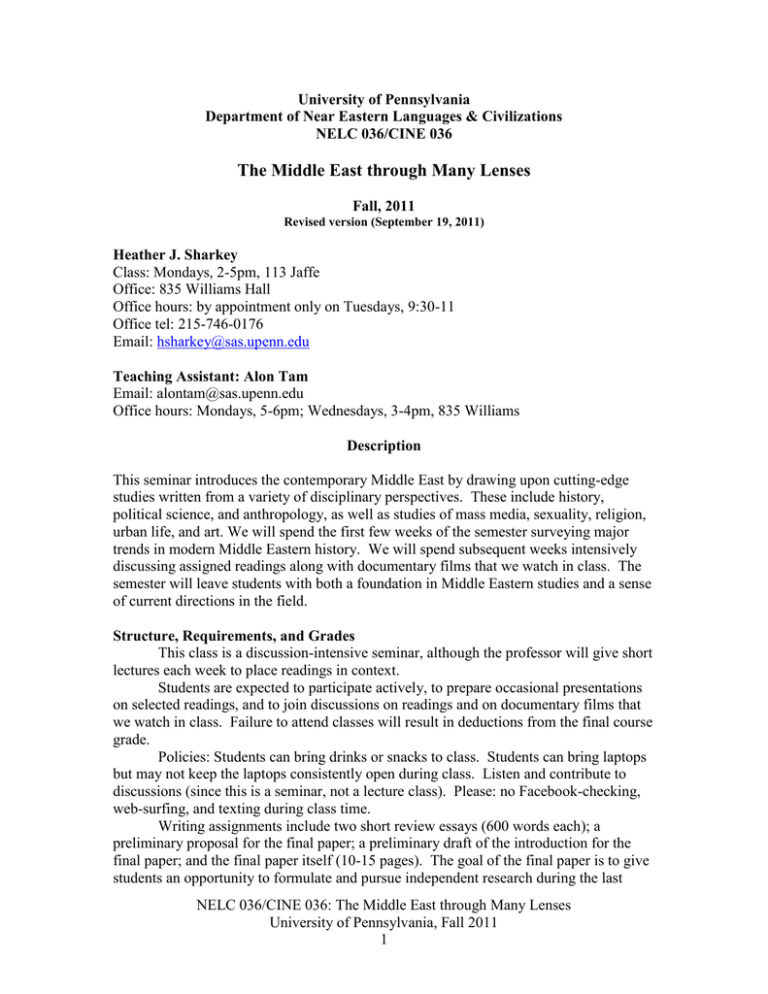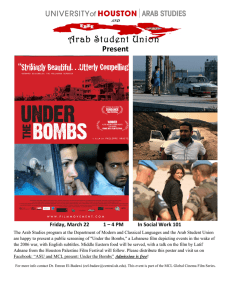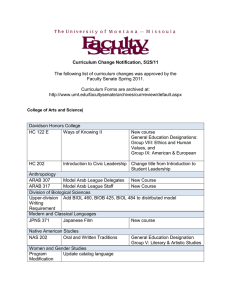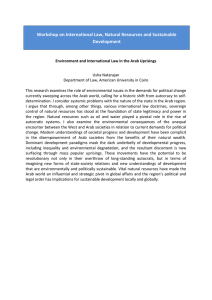The Middle East through Many Lenses
advertisement

University of Pennsylvania Department of Near Eastern Languages & Civilizations NELC 036/CINE 036 The Middle East through Many Lenses Fall, 2011 Revised version (September 19, 2011) Heather J. Sharkey Class: Mondays, 2-5pm, 113 Jaffe Office: 835 Williams Hall Office hours: by appointment only on Tuesdays, 9:30-11 Office tel: 215-746-0176 Email: hsharkey@sas.upenn.edu Teaching Assistant: Alon Tam Email: alontam@sas.upenn.edu Office hours: Mondays, 5-6pm; Wednesdays, 3-4pm, 835 Williams Description This seminar introduces the contemporary Middle East by drawing upon cutting-edge studies written from a variety of disciplinary perspectives. These include history, political science, and anthropology, as well as studies of mass media, sexuality, religion, urban life, and art. We will spend the first few weeks of the semester surveying major trends in modern Middle Eastern history. We will spend subsequent weeks intensively discussing assigned readings along with documentary films that we watch in class. The semester will leave students with both a foundation in Middle Eastern studies and a sense of current directions in the field. Structure, Requirements, and Grades This class is a discussion-intensive seminar, although the professor will give short lectures each week to place readings in context. Students are expected to participate actively, to prepare occasional presentations on selected readings, and to join discussions on readings and on documentary films that we watch in class. Failure to attend classes will result in deductions from the final course grade. Policies: Students can bring drinks or snacks to class. Students can bring laptops but may not keep the laptops consistently open during class. Listen and contribute to discussions (since this is a seminar, not a lecture class). Please: no Facebook-checking, web-surfing, and texting during class time. Writing assignments include two short review essays (600 words each); a preliminary proposal for the final paper; a preliminary draft of the introduction for the final paper; and the final paper itself (10-15 pages). The goal of the final paper is to give students an opportunity to formulate and pursue independent research during the last NELC 036/CINE 036: The Middle East through Many Lenses University of Pennsylvania, Fall 2011 1 month of class, by analyzing current research on a selected issue or sub-field. Note that students are required to follow the Chicago style for citations and bibliographies. We will spend some time discussing the Chicago method in class. Extensions for papers are not routinely granted. Late papers will be subject to daily five-point penalty deductions. The professor will not accept papers that are more than one week late. At the end of the semester students will give an oral presentation on their research. Students should regard this presentation to the class as an intrinsic part of the final project. Final papers are due on December 12th, one week after the last class, and should be submitted in both paper and electronic versions. Use footnotes or endnotes, and provide a bibliography – all in Chicago format. Throughout the semester we will devote time to discussing practical techniques for planning oral presentations; structuring, writing, and revising essays; and conducting independent research. If you wish to see me during office hours, contact me by email in advance to schedule an appointment. There will be no final exam. Books, Articles, and Films The following books are available for purchase at the Penn Book Center, 130 South 34th Street (34th & Sansom), Philadelphia. They are also on reserve in Van Pelt library. • Abdel Aal, Ghada. I Want to Get Married! One Wannabe Bride’s Misadventures with Handsome Houdinis, Technicolor Grooms, Morality Police, and Other Mr. Not Quite Rights. Trans. Nora Eltahawy. Austin: University of Texas Press, 2010. • Goodman, Susan Tumarkin. Dateline Israel: New Photography and Video Art. New York: The Jewish Museum, and New Haven: Yale University Press, 2007. • Limbert, Mandana E. In the Time of Oil: Piety, Memory, and Social Life in an Omani Town. Stanford: Stanford University Press, 2010. • Lipson, Charles. How to Write a BA Thesis: A Practical Guide from Your First Ideas to Your Finished Paper. Chicago: University of Chicago Press, 2005. • Özyürek, Esra, ed. The Politics of Public Memory in Turkey. Syracuse: Syracuse University Press, 2007. • Semmerling, Tim Jon. Israeli and Palestinian Postcards. Austin: University of Texas Press, 2004. • United Nations Development Programme. The Arab Human Development Report 2005: Towards the Rise of Women in the Arab World. New York City: United Nations Development Programme, 2006. NELC 036/CINE 036: The Middle East through Many Lenses University of Pennsylvania, Fall 2011 2 • Whitaker, Brian. Unspeakable Love: Gay and Lesbian Life in the Middle East. Berkeley: University of California Press, 2006. The documentary films that we will watch come from the Middle East Center’s Video Library (see http://mec.sas.upenn.edu/films.html) and from Van Pelt Library. Only the Van Pelt films will be on reserve. Grades will be calculated as follows: • attendance, participation, and oral presentations: 30% • short essay #1: 20% • short essay #2: 20% • final paper: 30% Week 1 – September 12: Introducing the Class FILM: Shahrbanoo, DVD, directed by Hamid Rahmanian & Melissa Hibbard (2002). 57 minutes. Van Pelt. Questions for Discussion: Where and what is the Middle East? What is/was the Near East? What and where is the Arab world? How do these areas relate to the Islamic world? Is it possible to produce objective or impartial studies of Middle Eastern history (or indeed, of any history)? What are some of the cutting-edge approaches to modern Middle Eastern studies today? Week 2 – September 19: From Empires to Nations • Esra Özyürek, ed., The Politics of Public Memory in Turkey (Syracuse: Syracuse University Press, 2007). Read Chapter 1, “Introduction: the Politics of Public Memory in Turkey” (by Esra Özyürek, pp. 1-15), Chapter 4, “Remembering a Nine-Thousand-Year-Old Site” (by Ayfer Bartu Candan, pp. 70-94); Chapter 5, “An Endless Death and an Eternal Mourning” (by Nazli Ökten, pp. 95-113); plus a fourth chapter of your choice. Be prepared to discuss all four chapters in class. • Vercihan Ziflioglu, “Ottoman Family Members Protest Harem Depiction in TV Series,” Hürriyet Daily News, January 12, 2011, http://www.hurriyetdailynews.com/n.php?n=ottoman-dynasty-harshly-protest-againstharem-and-sexuality-2011-01-12 (Accessed July 28, 2011). Class Discussion: How to Write a Book Review FILM: Sabiha Gokcen: The Legendary Girl of the Skies, DVD, directed by Ali Akyüz (2003). Duration not listed. Van Pelt. AND Coffee Futures, directed by Zeynep Devrim Gürsel (2009). 22 minutes. Questions for Discussion: What are the major themes of, and most important episodes in, modern Middle Eastern history? Where was the Ottoman empire, and how do its legacies persist? Regarding the volume edited by Özyürek, comment on the publisher’s description: “Turkish society is frequently accused of NELC 036/CINE 036: The Middle East through Many Lenses University of Pennsylvania, Fall 2011 3 having amnesia. It has been said that there is no social memory in Turkey before Mustafa Kemal Ataturk founded modern Turkey after World War I. Indeed, in 1923, the newly founded Turkish Republic committed to a modernist future by erasing the memory of its Ottoman past.” Week 3 – September 26: Tourism, Nationalism, and Identity Politics • Tim Jon Semmerling, Israeli and Palestinian Postcards: Presentations of National Self (Austin: University of Texas Press, 2004). FILM: The Inner Tour, DVD, directed by Raanan Alexandrowicz (2002). 98 min. Middle East Center. (For a review of this film, see, for example, Elvis Mitchell, “The Inner Tour (2001),” The New York Times, April 1, 2002.) Short Essay #1: Write a 600-word review of Semmerling’s Israeli and Palestinian Postcards. Week 4 – October 3: Art, Film, Politics • Susan Tumarkin Goodman, Dateline Israel: New Photography and Video Art (New York: The Jewish Museum, and New Haven: Yale University Press, 2007). • Will Ward, “Social Media and the Gaza Conflict,” Arab Media & Society, 7 (Winter 2009), http://www.arabmediasociety.com/?article=701 (Note: Will Ward is a Penn alumnus, class of 2005) • Omar Foda, “Saintly Soap Operas: An Examination of Three Coptic Saint Dramas,” Arab Media & Society, 12 (Winter 2010), http://www.arabmediasociety.com/?article=761 (Note: Omar Foda is a PhD candidate in NELC and was TA for this class last year.) • Alexandra Buccianti, “Turkish Soap Operas in the Arab World: Social Liberation or Cultural Alienation?”, Arab Media & Society, 190 (Spring 2010), http://www.arabmediasociety.com/topics/index.php?t_article=288 • Marwan Kraidy, “Reality Television and Politics in the Arab World: Preliminary Observations,” Transnational Broadcasting Studies (the forerunner of Arab Media & Society), Fall 2006, http://www.arabmediasociety.com/?article=37 FILM: Another Way Home, DVD, directed by Danae Elon (2004). 79 minutes. Van Pelt. NELC 036/CINE 036: The Middle East through Many Lenses University of Pennsylvania, Fall 2011 4 Questions for Discussion: What is “popular culture”? Is museum art generally “popular” art, or elite art? According to Goodman et al, what are the major concerns of leading Israeli visual artists, and what can the visual art of Dateline Israel tell us about Israeli society? What can we, as scholars, learn from soap operas and reality TV? Has Arab reality TV become a vehicle for nationalism(s)? FALL BREAK, October 8-11 Week 5 – October 17: City Women • Ghada Abdel Aal, I Want to Get Married! One Wannabe Bride’s Misadventures with Handsome Houdinis, Technicolor Grooms, Morality Police, and Other Mr. Not Quite Rights, Trans. Nora Eltahawy (Austin: University of Texas Press, 2010). • Ingrid Wassman, “Cyber Infidelity in Egypt’s Virtual World,” Arab Media & Society, 10 (Spring 2010), http://www.arabmediasociety.com/topics/index.php?t_article=291 • Michael Slackman, “A City Where You Can’t Hear Yourself Scream,” The New York Times, April 14, 2008. FILM: Driving an Arab Street, DVD, directed by Arthur Hurley (2002). 35 minutes. Van Pelt. Questions for Discussion: Judging from Ghada Abdel Aal’s book and Wassman’s article, how are new media technologies transforming the way people find companionship, romance, marriage, and sex? How does the Egyptian context that Abdel Aal describes bear a resemblance to, or differ from, the American context as you perceive it? What changes in a text when a blog (like Abdel Aal’s) turns into a book? Does this book have a “bloggish” quality? Week 6 – October 24: Tradition and Change • Mandana E. Limbert, In the Time of Oil: Piety, Memory, and Social Life in an Omani Town (Stanford: Stanford University Press, 2010). Short Essay #2: In Limbert’s book, read the first and last chapter plus two other chapters of your choice. Drawing upon these portions, write a 600-word review essay that considers the nature and extent of social change in contemporary Oman as well as the ways that people have either coped with change or searched to find “tradition”. FILM OR MUSIC: TBA Week 7 – October 31: Sexuality, Love, and Social Conventions NELC 036/CINE 036: The Middle East through Many Lenses University of Pennsylvania, Fall 2011 5 • Brian Whitaker, Unspeakable Love: Gay and Lesbian Life in the Middle East (Berkeley: University of California Press, 2006). FILM: Forbidden Marriages in the Holy Land, DVD, directed by Michel Khleifi (1999). 66 minutes. Van Pelt. Questions for Discussion: What was the Queen Boat raid in Egypt and why did it ultimately prompt Whitaker to write this book? How permissive/tolerant or impermissive/intolerant are Middle Eastern societies vis-à-vis sexuality? Is it possible to make generalizations (by region, time period, religious group, etc.) at all? In the past few years a spate of academic studies on the history of Middle Eastern sexual cultures has appeared. Why is there this new interest and what issues are these works broaching? What are the human rights dimensions of Whitaker’s study and of gay and lesbian life – as well as of heterosexual relations and cross-sectarian marriages – in general? In-class: Choosing a Final Paper Topic and Planning Your Research Week 8 – November 7: Women & Human Development • United Nations Development Programme, The Arab Human Development Report 2005: Towards the Rise of Women in the Arab World (New York City: United Nations Development Programme, 2006). In-class: Each student should be prepared to speak for 5 minutes about a portion of the UNDP report that was intriguing. Final Paper Proposal Due: This proposal has two parts. (1) Submit an abstract (250 words maximum) of your final paper topic, describing what you intend to study and what preliminary hypotheses you have. (2) Submit a bibliography listing at least four relevant published books or academic articles -- not internet sources. FILM: Garbage Dreams, DVD, directed by Mai Iskander (2009), 79 minutes. Questions for Discussion: If girls in the Arab world perform better than boys in school (see UNDP report, p. 7), then how can we account for lower levels of female literacy? When or how will that discrepancy end, based on your reading of the report? What is CEDAW? In which areas does the Arab world perform strongly vis-à-vis other developed and developing countries? (Identify areas of positive achievement.) How can we assess the social roles of women in Middle Eastern societies in general, and the nature and extent of their social “empowerment”, without succumbing to Orientalism? (Let’s discuss Orientalism as a concept and its relationship to the writings of Edward Said.) Week 9 – November 14: The Changing Media Landscape • Lawrence Pintak, “Reporting a Revolution: The Changing Arab Media Landscape,” Arab Media & Society, February 2007 http://www.arabmediasociety.com/topics/index.php?t_article=69 NELC 036/CINE 036: The Middle East through Many Lenses University of Pennsylvania, Fall 2011 6 • Editorial, “A New Direction or More of the Same?” (on blogging as a possible force for change in the Arab world, Arab Media & Society, 6 (2008), http://www.arabmediasociety.com/topics/index.php?t_article=230 • Sahar Khamis & Katherine Vaughn, “Cyberactivism in the Egyptian Revolution: How Civic Engagement and Citizen Journalism Tilted the Balance,” Arab Media & Society, 13 (Summer 2011), http://www.arabmediasociety.com/?article=769 • Mark Allen Peterson, “Egypt’s Media Ecology in a Time of Revolution,” Arab Media & Society, 13 (Summer 2011), http://www.arabmediasociety.com/?article=770 • Sandy Russell Jones, “Essential Readings: Bahrain: Origins of a Crisis,” Jadaliyya, April 10, 2011, http://www.jadaliyya.com/pages/index/1209/essentialreadings_bahrain_origins-of-a-crisis (Note: Sandy Russell Jones received her PhD from Penn in 2010.) • Kareem Abdulsalam, “Teargas Poems”, Trans. Elliott Colla, Jadaliyya, July 4, 2011, http://www.jadaliyya.com/pages/index/2036/kareem-abdulsalam_teargas-poems FILM: Control Room, directed by Jehane Noujaim (2004). 86 minutes. Van Pelt. (Consider reading Deborah Solomon, “The Way We Live Now: 4-25-04: Questions for Jehane Noujaim,” The New York Times, April 25, 2004.) Questions for Discussion: Has there been a media “revolution” in the contemporary Middle East? How have the internet and satellite TV changed the political and social landscape of the region? How important has blogging become as a vehicle for political expression? What role did new media play in the uprisings of “Arab Spring”? In-class: Signing up for oral presentations on Nov. 28th and Dec. 5th. Week 10 – November 21: Spotlight on Student Research • Charles Lipson, How to Write a BA Thesis: A Practical Guide from Your First Ideas to Your Finished Paper (Chicago: University of Chicago Press, 2005), pp. 1-65, 110-76, 317-50. • Cameron Stephen Hu, “Making and Unmaking Worlds: Architecture and Geopolitics in Millennial Dubai,” Honors Thesis, Near Eastern Languages & Civilizations, University of Pennsylvania, April 28, 2009. (Note: Cameron has given permission to share the PDF file with this class. I will post the file on Blackboard.) • Amanda El Dakhakhni, “Beur Literature: Defining Cultural Identity in a Space between Two Worlds,” Sound Politicks, 14:2 (Spring 2008), pp. 32-40. This was her paper from NELC 332, Fall 2007, on the literary production of second-generation North African immigrants in France. NELC 036/CINE 036: The Middle East through Many Lenses University of Pennsylvania, Fall 2011 7 Accessible at: http://www.polisci.upenn.edu/PiSigma/soundpoliticks/Spring2008SoundPoliticks.pdf • Michael Stewart, “Modernity and the Alevis of Turkey: Identity, Challenges, and Change,” Journal of International Relations, 9 (2007), pp. 50-60. This is the revised version of his final paper from NELC 335, Fall 2006. Accessible at: http://www.sirjournal.org/files/SIR_Journal_2007.pdf • Jacob Boyars, “The Druze and the Jews: The Origins of an Unlikely Alliance”, Kedma: A Journal on Jewish Thought, Jewish Culture, and Israel, 2 (2006), pp. 9-21. This is the revised version of his final paper for NELC 335, Fall 2005. Accessible at: http://www.hillel.upenn.edu/kedma/02/02toc.html • Elisheva N. Goldberg, “Not Skirting the Service: Religious Women in the Israeli Army,” Kedma, 8 (2009), pp. 29-41. This was the revised version of her paper for NELC 036, Fall 2008. Accessible at: http://www.hillel.upenn.edu/kedma/08/goldberg.pdf • Alexandra Leavy, “Searching for Baha’i Identity,” Journal of Cultural Studies of the Middle East and North Africa (JCSMENA), posted August 22, 2009. This is her final paper for NELC 336, Spring 2009. Accessible at: http://journal.jcsmena.org/2009/08/22/searching-for-bahai-identity/, and also posted on Iran Press Watch, http://www.iranpresswatch.org/post/4912 FILM: Divorce Iranian Style, DVD, directed by Kim Longinotto & Ziba Mir-Hosseini (1998). 80 minutes. Van Pelt. Questions for Discussion: What makes a research paper stand out? What makes a research paper publishable? How extensive can or should revisions be when developing a research paper for publication? How does one go about submitting a paper? How should one respond in case of rejection? Week 11 – November 28: Presentations Preliminary Draft of Final Paper Due: Submit the introductory section of your paper (approx. two pages). This introduction should provide an overview of your topic, explain the structure of your paper, and point to your general thesis or argument. The introduction is often the most difficult part of a paper to write, so it is critical that you give yourself the opportunity to get early feedback before revision. Week 12 – December 5: Presentations Final Paper due Monday, December 12th. Please submit your final papers in two formats: 1) a paper copy placed in my NELC mailbox; 2) an electronic copy, sent to me no later than 8pm, as a Word file via email. NELC 036/CINE 036: The Middle East through Many Lenses University of Pennsylvania, Fall 2011 8 Make sure that your paper follows the Chicago method for citing works. Use either footnotes or endnotes, and include a bibliography. NELC 036/CINE 036: The Middle East through Many Lenses University of Pennsylvania, Fall 2011 9



